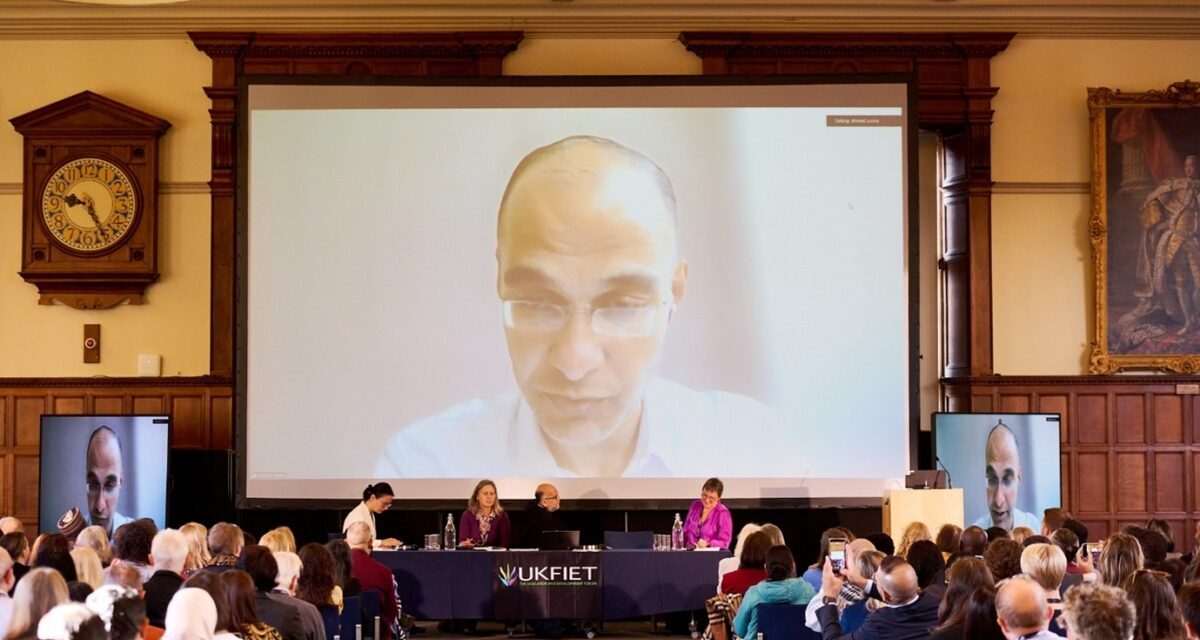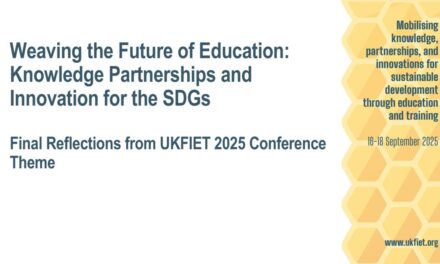From 16-18 September 2025, over 750 participants from 66 countries gathered in Oxford for our biennial conference, under the theme: ‘Mobilising knowledge, partnerships, and innovations for sustainable development through education and training’.
Recordings of the opening and closing plenary sessions are available to watch here.
Opening plenary
A field in crisis: reimaging education policy for challenging times
The conference was opened by this year’s Chair Emma Sarton, Cambridge Education. She reminded everyone why the conference theme of mobilising partnerships and innovation is more important now than ever. We are at a critical point for global education and the conference theme calls for more than reflection: it demands action. It invites us to think boldly, to work differently and to reimagine what educational transformation can look like when driven by genuine collaboration, grounded evidence and values of equity and inclusion. At its heart, this conference is not just about gathering ideas; it is about galvanising a movement.
Our first keynote speaker was Ahmed Kamal Junina, Assistant Professor and Head of the English Department, Al-Aqsa University, Gaza. Ahmed joined us virtually from Gaza city as it was being attacked by Israel. He reminded us of the fragility of education – more than 650,000 students in Gaza are being denied education for a third year. Nearly every school has been damaged, many turned into overcrowded shelters. Universities, too, have been flattened, leaving tens of thousands without access to higher education. An entire generation’s future hangs in the balance.
At a time when Ahmed should have been preparing his children for their first day of school or welcoming students to the university, we were humbled that he could join us under extremely volatile circumstances. He had spent the night before in the emergency department of a mobile hospital with his nephew and he documented the current situation through an article in The Independent: Back to school in Gaza is now. Education reduced to fragments.
A few weeks prior to the conference Ahmed had written an article for The Guardian documenting the challenges of starvation, yet how solidarity is teaching students that their thoughts matter: Too hungry to think, too weak to sit upright. Concentration slips away’: the struggle to stay focused as an academic in Gaza.
Our second keynote speaker was Yusuf Sayed, Professor of International Education, REAL Centre, University of Cambridge. Yusuf reminded us that education remains the cornerstone for sustainable development, yet asked if current education policy pathways can adequately respond to the current converging global poly-crises we find ourselves in. He also asked us to reflect on what are we researching and for whom?
Yusuf reminded us that in Gaza, for the last two years, a classroom of children are being killed every day. This killing is not only physical but also in every other way (relating to hopes, dignity and human rights for example). Inequality is the driving force of these conflicts and crises and we need to discuss reparations for these inequalities.
Yusuf interrogated contemporary education policy pathways employing a decolonial critical policy analytic framework to respond to the exigencies of conflict-induced displacement, rising populism, and the climate catastrophe. He urged that in this world of ‘monsters’, there is a need to think and work differently— advocating for education policies that are transformative and promote social justice in and through education.
Closing plenary
Turning disruption into direction, and responsibility into opportunity
The Closing Plenary was opened by this year’s Conference Co-Chair Fran Salvi, University of Nottingham. She gave a very brief summary of some of the themes from the few days: humble partnerships and relationships that work across boundaries; centring more inclusive societies; the relationship between environment and learning; interdisciplinarity; our communal sense of hope and optimism; courage to confront difference and painful truths to support learning and change; humility and creativity.
This was followed by a panel discussion:
Dr Laura Savage, Executive Director, International Education Funders Group (IEFG) stressed that we need to make the case for education. Education is making a difference and we need to celebrate the progress we are making.
Dr Folake Olatunji-David, Director, Basic Education Department, Federal Ministry of Education, Nigeria emphasised that we need to strengthen our capacity to embrace change!
Dr Hussein Mohammed Omar, Deputy Permanent Secretary, Government of Tanzania outlined how we need to move from projects to systems; from data to action; partnership and collaboration; and we need to support our teachers.
Judith Herbertson, Girls Education Lead, FCDO, encouraged us to think about a new paradigm with an end to aid and for us to focus on strengthening policies informed by evidence – forcing us to new ways of working. We are moving from donor to investor; from service delivery to systems support; from grants to expertise; from international intervention to local provision for local solutions. We must continue centring data, evidence and research to inform decisions and have an impact on what works.
Khadijah Fancy, Cambridge Education, chaired the panel discussion and also asked us to think about the ‘monsters’ that are looming around the corner. We hope that discussions at the 2025 UKFIET Conference have given us all inspiration and strength to face these monsters together as a community!


